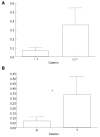Expression level of beta-catenin is associated with prognosis of esophageal carcinoma
- PMID: 17552014
- PMCID: PMC4146827
- DOI: 10.3748/wjg.v13.i18.2622
Expression level of beta-catenin is associated with prognosis of esophageal carcinoma
Abstract
Aim: To examine the association of beta-catenin with the clinicopathologic features and prognosis of esophageal squamous cell carcinoma (ESCC).
Methods: Beta-catenin mRNA expression level in 40 ESCC patients (28 males and 12 females, age range 38-82 years, median 60 years) was analyzed by real-time PCR. Beta-catenin mRNA expression levels in tumor cells were categorized as weaker (level 1) or equal to or stronger (level 2) than those in endothelial cells. We examined the correlation between the beta-catenin expression and the clinicopathological factors and prognosis of ESCC patients.
Results: Level 2 beta-catenin expression was found in 29 patients. ESCC with level 2 expression had a higher rate of lymphnode metastasis (0.0776 +/- 0.0369 vs 0.3413 +/- 0.1803, P < 0.001) and deeper tumor invasion (0.0751 +/- 0.0356 vs 0.3667 +/- 0.1928, P < 0.001), and a poorer survival rate (P = 0.0024) than ESCC with level 1 expression.
Conclusion: Beta-catenin expression in ESCC is of great importance.
Figures



Similar articles
-
Association of Wnt1/beta-catenin with clinical pathological characteristics and prognosis of esophageal squamous cell carcinoma.Genet Test Mol Biomarkers. 2010 Jun;14(3):363-9. doi: 10.1089/gtmb.2009.0173. Genet Test Mol Biomarkers. 2010. PMID: 20491588 Free PMC article.
-
Clinicopathological significance of wnt/β-catenin signaling pathway in esophageal squamous cell carcinoma.Int J Clin Exp Pathol. 2015 Mar 1;8(3):3045-53. eCollection 2015. Int J Clin Exp Pathol. 2015. PMID: 26045816 Free PMC article.
-
Association of β-catenin, Wnt1, Smad4, Hoxa9, and Bmi-1 with the prognosis of esophageal squamous cell carcinoma.Med Oncol. 2012 Mar;29(1):151-60. doi: 10.1007/s12032-010-9816-5. Epub 2011 Jan 23. Med Oncol. 2012. PMID: 21259057
-
Expression level of valosin-containing protein (p97) is associated with prognosis of esophageal carcinoma.Clin Cancer Res. 2004 Aug 15;10(16):5558-65. doi: 10.1158/1078-0432.CCR-0723-03. Clin Cancer Res. 2004. PMID: 15328197
-
Expression of klotho and β-catenin in esophageal squamous cell carcinoma, and their clinicopathological and prognostic significance.Dis Esophagus. 2016 Apr;29(3):207-14. doi: 10.1111/dote.12289. Epub 2014 Oct 6. Dis Esophagus. 2016. PMID: 25287007
Cited by
-
Association of Wnt1/beta-catenin with clinical pathological characteristics and prognosis of esophageal squamous cell carcinoma.Genet Test Mol Biomarkers. 2010 Jun;14(3):363-9. doi: 10.1089/gtmb.2009.0173. Genet Test Mol Biomarkers. 2010. PMID: 20491588 Free PMC article.
-
Expression and prognostic value of SFRP1 and β-catenin in patients with glioblastoma.Oncol Lett. 2016 Jan;11(1):69-74. doi: 10.3892/ol.2015.3873. Epub 2015 Nov 5. Oncol Lett. 2016. PMID: 26870169 Free PMC article.
-
miR-195 inhibits esophageal cancer cell proliferation and promotes apoptosis by downregulating YAP1.Int J Clin Exp Pathol. 2019 Jan 1;12(1):275-281. eCollection 2019. Int J Clin Exp Pathol. 2019. PMID: 31933743 Free PMC article.
-
Wnt Pathway-Targeted Therapy in Gastrointestinal Cancers: Integrating Benchside Insights with Bedside Applications.Cells. 2025 Jan 24;14(3):178. doi: 10.3390/cells14030178. Cells. 2025. PMID: 39936971 Free PMC article. Review.
-
Chitinase 3-like 1 secreted by peritumoral macrophages in esophageal squamous cell carcinoma is a favorable prognostic factor for survival.World J Gastroenterol. 2017 Nov 21;23(43):7693-7704. doi: 10.3748/wjg.v23.i43.7693. World J Gastroenterol. 2017. PMID: 29209110 Free PMC article.
References
-
- Dawsey SM, Wang GQ, Weinstein WM, Lewin KJ, Liu FS, Wiggett S, Nieberg RK, Li JY, Taylor PR. Squamous dysplasia and early esophageal cancer in the Linxian region of China: distinctive endoscopic lesions. Gastroenterology. 1993;105:1333–1340. - PubMed
-
- Faivre J, Forman D, Estève J, Gatta G. Survival of patients with oesophageal and gastric cancers in Europe. EUROCARE Working Group. Eur J Cancer. 1998;34:2167–2175. - PubMed
-
- Eloubeidi MA, Desmond R, Arguedas MR, Reed CE, Wilcox CM. Prognostic factors for the survival of patients with esophageal carcinoma in the U.S.: the importance of tumor length and lymph node status. Cancer. 2002;95:1434–1443. - PubMed
-
- Greenlee RT, Hill-Harmon MB, Murray T, Thun M. Cancer statistics, 2001. CA Cancer J Clin. 2001;51:15–36. - PubMed
-
- Ueyama T, Kawamoto K, Yamada Y, Masuda K. Early esophageal carcinoma. Evaluation of the depth of invasion based on double-contrast esophagography. Acta Radiol. 1998;39:133–137. - PubMed
MeSH terms
Substances
LinkOut - more resources
Full Text Sources
Medical

